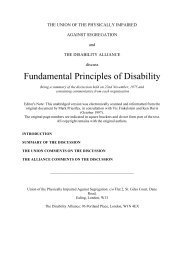Global-Report-Living-Colour-dr2-2
Global-Report-Living-Colour-dr2-2
Global-Report-Living-Colour-dr2-2
Create successful ePaper yourself
Turn your PDF publications into a flip-book with our unique Google optimized e-Paper software.
Inclusive Communities = Stronger Communities<br />
GLOBAL REPORT ON ARTICLE 19: THE RIGHT TO LIVE AND BE INCLUDED IN THE COMMUNITY<br />
81<br />
• 58% of parents/caregivers report spending more than 40<br />
hours per week providing support for their loved ones<br />
with intellectual disabilities, including 40% spending<br />
more than 80 hours a week.<br />
• Nearly half (46%) of parents/caregivers report that they<br />
have more caregiving responsibilities than they can<br />
handle.<br />
• The vast majority of caregivers report that they are<br />
suffering from physical fatigue (88%), emotional stress<br />
(81%) and emotional upset or guilt (81%) some or most<br />
of the time.<br />
• 1 out of 5 families (20%) report that someone in the<br />
family had to quit their job to stay home and support<br />
the needs of their family member” (Finds, 2010)<br />
The commitments to families in the Universal Declaration<br />
of Human Rights, the Convention on the Rights of the<br />
Child and the CRPD, should help to support people who<br />
have an intellectual disabilities to live and be included in<br />
the community. Unfortunately, our members have told us<br />
that both the State and society fall short in meeting these<br />
obligations. The capacity of families to provide this<br />
support depends on the way in which communities and<br />
governments provide assistance to them.<br />
Key Issues For Families:<br />
‰ Need for Short Term Breaks<br />
Families need relief from the sole responsibility for<br />
their sons and daughters 24 hours a day, 365 days a<br />
year. This is best accomplished by guaranteeing that<br />
children with intellectual disabilities have access to<br />
early education and education programmes as well as<br />
child care for non-school hours so parents can work.<br />
The inclusive pre-school programmes in Bogota,<br />
Colombia provide a good example as does the<br />
inclusive education system in New Brunswick,<br />
UNITED STATES Analee lives with<br />
her 21-year-old son Nicky, who has<br />
autism, in North Carolina. She quit her<br />
job three years ago to stay home with<br />
Nicky after he graduated from high<br />
school with no real idea of what would<br />
come next. Meanwhile, money is tight<br />
and Nicky’s dad has taken work in<br />
Florida to support the family. They<br />
would like to be together, but after<br />
checking into the possibility, they<br />
realize that the situation in Florida<br />
would be even worse that what they<br />
face in rural North Carolina. Recently<br />
Analee found a small group home<br />
about an hour’s drive away that she<br />
feels would be a good place for Nicky<br />
to make the transition from his<br />
family’s home to living semiindependently<br />
as an adult. That would<br />
also allow her to go back to work. She<br />
says, “it felt just right! I just couldn’t<br />
believe we had lucked out to find such<br />
a right fit for Nicky!” She has not<br />
been given a place there because of<br />
regulations and policies.



